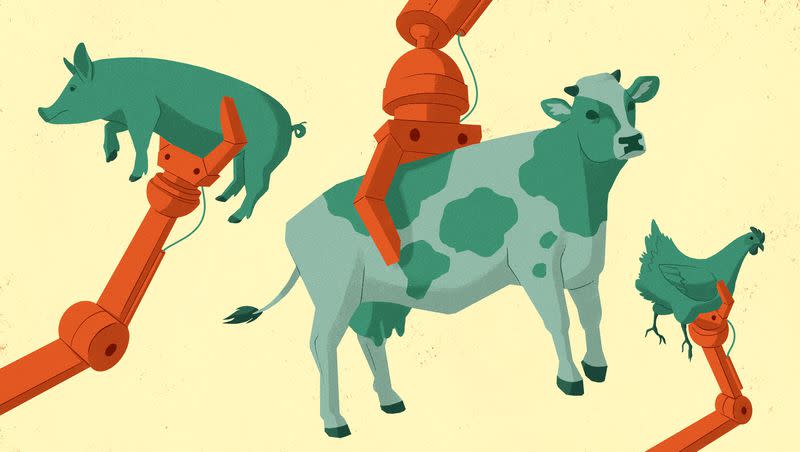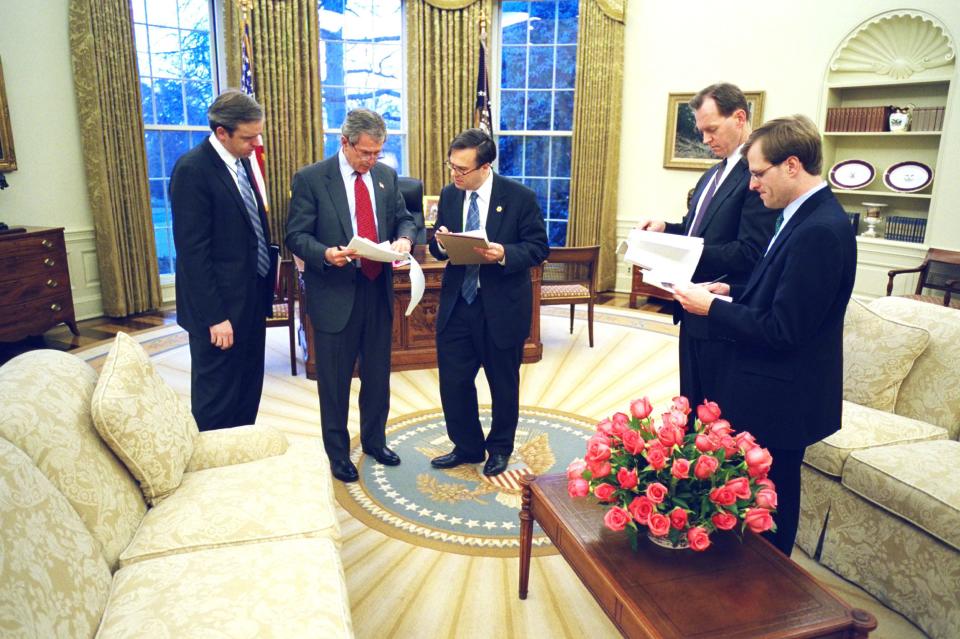Matthew Scully wants you to think twice about that burger

- Oops!Something went wrong.Please try again later.
- Oops!Something went wrong.Please try again later.
- Oops!Something went wrong.Please try again later.
Matthew Scully has crafted soul-stirring speeches for a constellation of GOP stars: George W. Bush, Dick Cheney, Sarah Palin and Mike Pence among them. He has been called, by his longtime speechwriting partner John McConnell, “as good a writer as has ever written for a president, just a superior talent.”
But for the past 20 years, some of the most moving words that Scully has composed have been about … dogs, cows and pigs.
The Arizona resident began a shadow career as an advocate for animals in the 1990s. Later, as he wrote speeches for policymakers and presidents in his day jobs, Scully labored nights and weekends on what would become one of the most important books in the animal rights movement: “Dominion,” published in 2002. It was his only book until he published “Fear Factories” in December.
“Fear Factories” is a compilation of articles and essays Scully wrote between 1993 and 2023, the bulk of which appeared in National Review — a flagship journal of conservatism. It was, he admits, an unlikely venue for the sort of advocacy that Scully engages in. Animal protection is widely seen as an issue of the left, to the point where some people see a “meat culture war” in American society.
To some conservatives, “My essays were time-wasting nonsense, ‘vegan propaganda,’ belonging in ‘leftist’ publications,’ and so on,” Scully writes in “Fear Factories.”
That sort of disdain is still often seen on the political right. Former GOP presidential candidate Vivek Ramaswamy was mocked on social media for being a vegetarian, especially because he says he doesn’t eat meat for moral reasons.
Vivek didn’t realize that republicans would never vote for a vegetarian
— Charles Williams (@demosticles) January 16, 2024
Morality, however, is central to the arguments that Scully, 64, makes when he condemns factory farming, trophy hunting and other practices that cause animals to suffer. “We humans deplore cruelty and yet we tolerate it on a horrific scale,” he says. He connects being “pro-life” with being “pro-animal,” writing, “I first learned about the ‘abortion rights’ cause and about the ruthlessness of industrialized farming around the same time, at the age of 13 or 14, and my reaction to both was similar: You just don’t treat life that way.”
A teenage vegetarian
The youngest son in a family with three daughters and three sons, Scully told me that he lived in multiple states growing up, including New York, Colorado and Ohio.
His moral awakening came at the behest of a dog: a golden brown stray that his parents let into their home in Casper, Wyoming, on a snowy night when Scully was just a toddler. He became so attached to the dog, named Lucky — and the dog equally attached to him — that as Lucky neared the end of his life, Scully would sometimes cancel plans in order to stay home with his canine friend. It was that relationship that caused Scully to think deeply about the moral incongruity of how our society treats animals: welcoming some into our homes, and directly causing or ignoring the mistreatment of others.
“Sometimes it takes a dog to help us think straight,” he wrote in the essay “Lessons from a Dog,” first published in National Review. “In this case, the lesson was moral coherence.”
Scully announced at age 15 that he would no longer eat meat, and says that his “conservative Republican, National Review-subscribing parents” respected his decision. “My mother even went out in search of new sustenance for me, returning with every faux-meat alternative that grocery stores in 1974 had to offer.”
After high school, he went to Arizona State University where he wrote editorials for the school newspaper that John O’Sullivan, an editor at National Review, came across. O’Sullivan became a mentor of sorts — Scully calls him a “patron” — which led to Scully becoming the assistant literary editor and then the literary editor of National Review, “which would lead to still more opportunities in Washington, D.C., and beyond,” he wrote in the acknowledgments of “Fear Factories.”
Those opportunities included writing speeches for Vice President Dan Quayle and Pennsylvania Gov. Bob Casey. He was later hired by the George W. Bush campaign in 1999 and would work for President Bush for about five years, including a period of especially important speeches — right after the 9/11 terror attacks.

‘A friend of everyone’
For all his professional success as a speechwriter and his fame in animal protection circles, Scully is virtually a ghost on the internet, save for his own bylined articles. He has no website or social media presence, other than other people mentioning his name. He gave interviews when “Dominion” was published, including one with The Washington Post in which he shut down rumors that he was fired by the White House for writing the book. He and his wife, Emmanuelle, a trilingual violinist and artist, stay out of the headlines, concentrating on their work and raising their teenage twin sons. All four are vegans.
But what Scully lacks in self-promotion, he makes up for in relationships, many of which were born of his animal advocacy.
There is, for example, the couple whose relationship was facilitated, in part, by one of Scully’s articles in National Review. After The New York Times published an article about the couple’s marriage, Scully reached out to Josh Loigman and Ann Porter Loigman, and they developed a friendship to the point where Scully mentions them in his new book.
Josh Loigman, an attorney who lives in northern Virginia, told me, “It appears to be the case that he becomes a friend of everyone with whom he speaks, and I would also say, a very loyal one.”
In the Times article — headlined “Conservative and a Vegan in New York. Wait! You Are, Too?” — Ann Porter Loigman talked about how Scully’s essay on the parallels of being pro-life and pro-animal helped her to move from being a vegetarian to a vegan. “I couldn’t believe how inconsistent my belief systems were,” prior to reading the article, she told the Times.
Others tell similar stories of how reading a single essay or chapter of Scully’s work changed a person’s eating habits on the spot.
“Obviously, he has a gift; his writing is so powerful. His pig chapter in ‘Dominion’ — it is called ‘Deliver Me From My Necessities’ — I told my then-27-year-old-son about it, and he went vegan after reading that. That’s how powerful the book is,” said Amanda Upshaw, who first read “Dominion” three years ago and has since named her farm animal sanctuary in Fairhope, Alabama, after the book.
In the chapter that Upshaw mentioned, Scully describes hog farms that he visited in North Carolina where up to 600 hogs were encased in iron crates in which they could not turn around. Gestational crates, though ones in the Netherlands, are pictured on the cover of Scully’s new book.
Upshaw told me she has bought 10 copies and intends to buy more to give to friends.
A speechwriter’s flair
This is not to say that Scully converts everyone who encounters his work. As he admits, many intelligent and ethical people disagree with his conclusions, and Scully has been accused of being “unduly emotional” in his arguments. Even though “Dominion” is deeply researched, it retains a speechwriter’s flair, as when Scully wrote about “the bright, sensitive pig dangling by a rear hoof as he or she is processed along, squealing in horror; the veal calf taken from his mother, tethered and locked away in a tiny dark stall for all of his brief, wretched existence. If you could walk all of humanity through one of these places, 90 percent would never touch meat again.”
But even his critics underestimated the lasting influence of “Dominion.” One reviewer, Wesley J. Smith, a critic of the extremes of the animal rights movement, added a postscript to his remarks on the book in the journal First Things, writing four years later, “Scully’s book had a greater impact than I thought it would back in 2002 when my review was written, but I think my criticism remains apt.”
Scully’s critics include those who say he does not go far enough in defense of animals and those say there are inconsistencies in his thinking. But the biggest pushback appears to be a segment of conservatives who believe this sort of thinking does not fit with what they see as conservative and even religious principles, and that animal issues don’t, as he wrote, “warrant the attention of serious people.” The tension between Scully’s animal advocacy and the disparate beliefs of many of those in the GOP was perhaps best illustrated in 2008 when he wrote a speech for Sarah Palin, a sport hunter, raising eyebrows at The Atlantic and Time magazine.
But it’s that incongruity, perhaps, that makes Scully such a powerful voice for animal welfare: no other person speaking out against the exploitation of animals today has such a regal pedigree within the GOP.
“There are very few people who have the bona fides, the background, to end up in the publications that he’s ended up in,” Loigman said. “It’s fair to say that only someone with the background that he has, coupled with the writing ability he has, could result in people considering things that they would not have come to consider if not for him.”
As for Scully, he wants people of all political persuasions to spend more time thinking, calling for “honest reasoning, a careful weighing of choices, and some sensible moral dot-connecting.” In short, as he writes: “work up some moral energy and think.”

